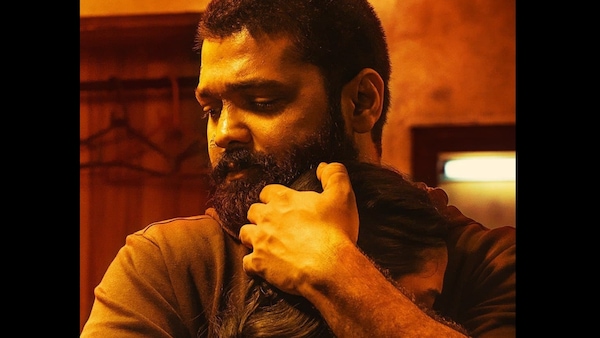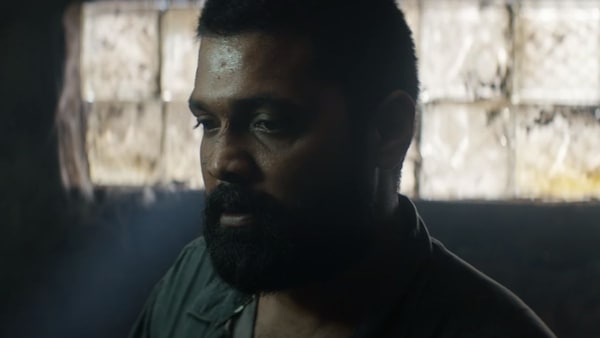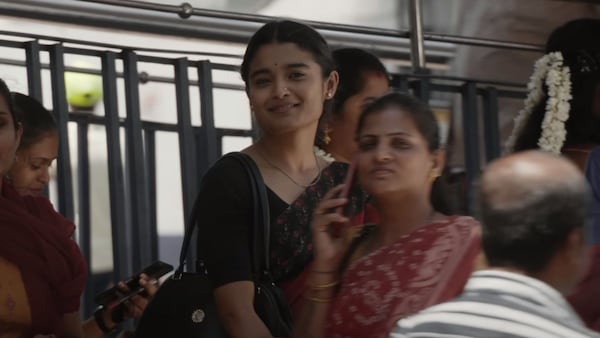Sapta Sagaradaache Ello Side B review: Rakshit Shetty's film treads dark but predictable waters
Hemanth M Rao's film, of course, is visually rich & deep and even boasts great performances, but it feels let down by a contrived story. Sapta Sagaradaache Ello Side B is now streaming on Amazon Prime

Last Updated: 11.35 PM, Jan 25, 2024
Story:
Manu (Rakshit Shetty) must try hard to resume his old life and also deal with the demons of the past. Will he succeed in his new quest to regain love and happiness? Will he reunite with Priya (Rukmini Vasanth)? Or will he be led on to a new path altogether?
Review:
A lot seemed at stake for Hemanth M Rao's Manu and Priya as the end credits rolled up in 'Sapta Sagaradaache Ello Side A'. A kind of palpable unease was felt by the viewer at that point but luckily for the makers, that feeling would somehow metamorphose into anticipation for the conclusion or the 'Side B' of the film. Will Manu and Priya reunite after all is the poignant question that has been swirling around in the air in the lead-up to the release of the second instalment, but knowing how Hemanth Rao likes to operate, one could not expect the answer to be a straightforward one.
There's a clear reason why he wished to extend the story by a considerable length with the second part because something larger was meant to be unravelled in the course. A course with ebbs, flows, love, loss, retribution and so much more that you don't demand the said answer right away but rather wish for it to trickle down towards you at its own pace. To his credit, Hemanth seems at leisure here and has his wits about him to orchestrate the narrative with careful diversions. The problem, though, occurs when those diversions turn into contrivances and before you know it, there's a few too many of them.
While 'Sapta Sagaradaache Ello Side A' felt feather-light as a cinematic experience because of its many small but endearing moments, 'Side B', quite surprisingly feels dense and heavy (perhaps intentional on the director's part) because of the emotional baggage it carries. And as a result, the new film is unfortunately let down by the weight of its own inventiveness. That keenness to subvert our expectations is laudable, no doubt, but he foregoes logic and the very nuance we sought after watching the previous instalment in that pursuit.
Also Read: Sapta Sagaradaache Ello Side A review: Hemanth M Rao's throbbing love story leaves you wanting more
A majority of the problem stems from the fact that 'Side B', almost in its entirety, is told as Manu's story and Priya, for some reason, isn't as prominent a character as she was in Side A. We see her as this woman who has almost resigned from being happy and is stuck in a limbo of sorts. As much as that seems like the logical course that a character in her situation would take, where Hemanth Rao gets it wrong is in choosing to guide her story through Manu and not give her the autonomy she deserves. It isn't that Priya needs a confrontation of any kind to address everything she has been (put) through. It is more about giving her the choice to accept sorrow or grief as she feels like it and carve a path of her own. Instead, she is rendered more as an accessory to Manu's journey in Sapta Sagaradaache Ello Side B.
Rukmini Vasanth, despite all these limitations, does a great job at showing that she can say a lot just with her demeanour and stance. It's interesting how Priya fares in the film but Rukmini does a beautiful job of breathing life into her. If only the story wasn't so preoccupied with the male protagonist's 'saviour syndrome', one might have actually had the chance to see her extracting more from a very promising character.
But that doesn't mean the film has been rid of subtlety. There's a long trail of metaphors we find along the narrative, from Manu still living in the prison of his memory and Priya finding a contraption of her own to the bright burning Red very stealthily yet nonchalantly replacing the tranquil Blue in the former's life. Rage, expectedly, becomes the operative word for Hemanth and he is very skilful at revealing how Manu's turmoil becomes apparent to us. If Side A was about Priya's muted doggedness, Side B is about her male counterpart's disquiet. Rakshit Shetty is particularly impressive of the lot not only because he has been given the biggest platform of all but also because he seems very well aware of the pitch of his character.

The same charm is, however, forced to counter a bumpy and predictable narrative at regular intervals. The film's visual grammar is extremely rich and Hemanth Rao and DOP Advaitha Gurumurthy continue to be in perfect sync. The way the first encounter between Manu and Surabhi (Chaithra J Achar) is played with minimum dialogue is a great instance of the director's biggest strengths and he succeeds most when he is in the moment, utilizing every little object (both physical and figurative) in the scene to its maximum potential. If Manu's face is painted across with a giant scar, so is the mirror in the room of that shady lodge room he often visits. If Priya once daydreamed of walking barefoot on a pristine beach, she now spends her reality combating angry street dogs in her neighbourhood. The issue, though, is that the same depth in the visual poetry doesn't make up for the predictability of the story progression.

We spot a lot of small moments from afar and the major ones don't really occur in a timely manner. I wasn't convinced by how Soma, the intriguing character played by Ramesh Indira, enters the scheme of things and it won't be unfair to say that he doesn't pose any significant impact on Manu's life, let alone the whole story. Nor did I walk out feeling pleased about how Surabhi's arc is lent an abrupt and rather drastic high just because the story wishes to reach its intended point. The way Hemanth Rao and his co-writer Gundu Shetty navigate Manu's new life and slowly reshape the core of the film is admirable, but they also end up going overboard and cramming it up with a few too many subplots. Thereby, Manu's whole revenge bit, which was to be a major element of the story, feels misplaced and frankly, dull and boring.
Chaithra J Achar boasts a great grasp on the energy of her character but her growth in the story is stunted without any second thought (an edit call, perhaps?). Gopal Deshpande, on the other hand, as Prakasha is effective despite the fact that the writing doesn't offer him a lot of scope.
As far as the all-important conclusion of the film is concerned, it is possible that one will emerge out of the cinema hall thinking about the visceral action sequence that has been pulled off with great finesse. The said sequence could seem a bit uncharacteristic of Hemanth Rao for a little while but it functions as a great crescendo to the emotional intensity that's been peaking all along. Rakshit, again, is incredible in the scene and is offered excellent support by both Advaitha Gurumurthy and Charan Raj. The music composer, once again, reveals himself as one of the film's most priced possessions through his score and it's just exceptional how quietly he switches the tone of this film from the previous one.
Also Read: Rukmini Vasanth Exclusive | 'Sapta Sagaradaache Ello' has changed me at a molecular level
Verdict:
It's a mighty hard task to rate a film like 'Sapta Sagaradaache Ello Side B' out of a particular score because Hemanth M Rao, even when not at his best, is capable of delivering some fascinating cinematic moments. He is well aware of the film he wants to make here and has a lot of conviction about just how he goes about everything, but his craftiness doesn't compensate for the slightly contrived writing. That said, it is also possible that you might overlook all of it and instead enjoy the visual treatment, the performances, the score and other aspects of the film. Sapta Sagaradaache Ello Side B, for that reason alone, warrants a visit to the theatre.
Subscribe to our newsletter for top content, delivered fast.

